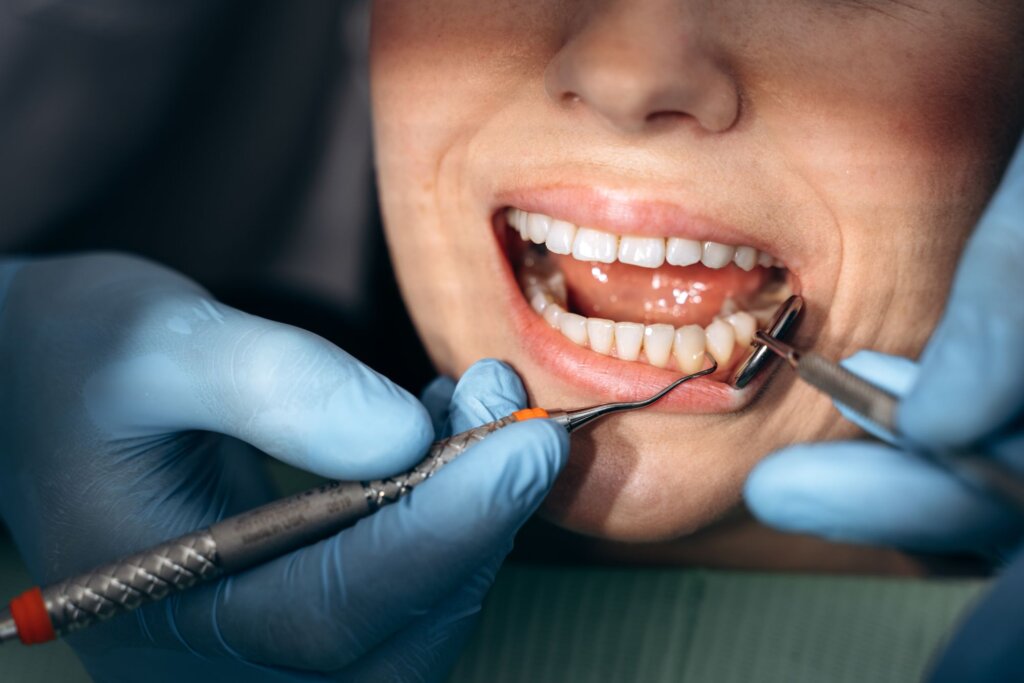Chipping a tooth can happen in an instant. You might’ve bit down on something hard, taken an unexpected fall, or experienced an accident while playing sports. While it may or may not be painful right away, a chipped tooth should never be ignored. Even small chips or tooth breakage can lead to more damage, sensitivity, or infection if left untreated.
If you’ve chipped a tooth, here’s what to do next to protect your mouth and prevent complications.
Rinse and Protect the Tooth
To prevent infection and remove any blood or debris, rinse your mouth with warm water. If your tooth continues to bleed, apply gentle pressure with a piece of moistened gauze until it stops.
If the chipped tooth has a sharp edge that could irritate your tongue or cheek, cover it with dental wax (available at most drugstores) to protect your mouth until you can get to the dentist.

Assess the Damage
The first thing to do after rinsing your mouth is to take a closer look at the chip. If possible, look in a mirror or ask someone to help you inspect the tooth. Chipped teeth can vary in severity, from small surface cracks in the enamel to more significant fractures that expose the inner layers of the tooth.
Ask yourself the following questions:
- Is the chip small and only affecting the outer edge of the tooth?
- Is there pain or sensitivity when eating, drinking, or touching the tooth?
- Does the tooth have a jagged edge that could cut your tongue or cheek?
- Is a large portion of the tooth missing?
If the chip is minor, it may not require emergency treatment, but you should still see a dentist as soon as possible to prevent further damage. If the tooth is painful, bleeding, or severely broken, you may need urgent dental care.
Save Any Broken Pieces (If Possible)
If a large portion of the tooth has broken off, try to find and save the piece. Wrap the piece of tooth in wet gauze to keep it from drying out while you wait to see the dentist. In some cases, the tooth fragment can be reattached.
If an entire permanent tooth has been knocked out, rinse the tooth gently in warm water, hold it by the crown (do not touch the root), and try to place it back in its socket. Bite down on gauze to keep it in place. You’ll need to see an emergency dentist as soon as possible for best chances of reimplanting the tooth.
Schedule a Dental Appointment
Even if the chip is small and not painful, it’s important to see a dentist as soon as possible. A professional evaluation will determine whether the tooth needs repair to prevent further damage or decay.
Your dentist may recommend the following procedures:
- Dental bonding: For small chips, a tooth-colored resin can be applied and shaped to restore the tooth’s appearance.
- Dental veneers: A thin shell of porcelain can cover larger chips for a smooth, natural look.
- Dental crowns: If a significant portion of the tooth is missing, a crown may be needed to protect and strengthen it.
- Root canal treatment: If the damage exposes the inner pulp, a root canal may be necessary to remove infected tissue and prevent further problems.
Manage Pain and Sensitivity
If you do experience pain after chipping or losing a tooth, you’ll want to manage the pain and sensitivity. Take over-the-counter pain relievers if needed, such as ibuprofen or acetaminophen. Avoid extremely hot or cold foods, which can trigger sensitivity. Eat softer foods that require less chewing, and if you must chew, use the opposite side of your mouth. To reduce swelling, apply a cold compress to the outside of your cheek for 10-15 minutes.
Preventing Future Chips and Cracks
While accidents happen, there are ways to reduce the risk of chipping a tooth in the future, like wearing a mouthguard during contact sports, not chewing on foods like ice or hard candies, and not using your teeth to open packaging. Finally, maintain good oral hygiene to protect your teeth and keep them healthy!
Don’t Ignore a Chipped Tooth
Even if a chipped tooth doesn’t hurt or feel like a big deal, it’s important to see a dentist to prevent further issues. The sooner you see a dentist, the better the chances of a simple and effective repair.
This article is meant for informational purposes only and is not meant as a substitute for professional medical advice. If you have further questions or concerns, make an appointment with a trusted local dentist.